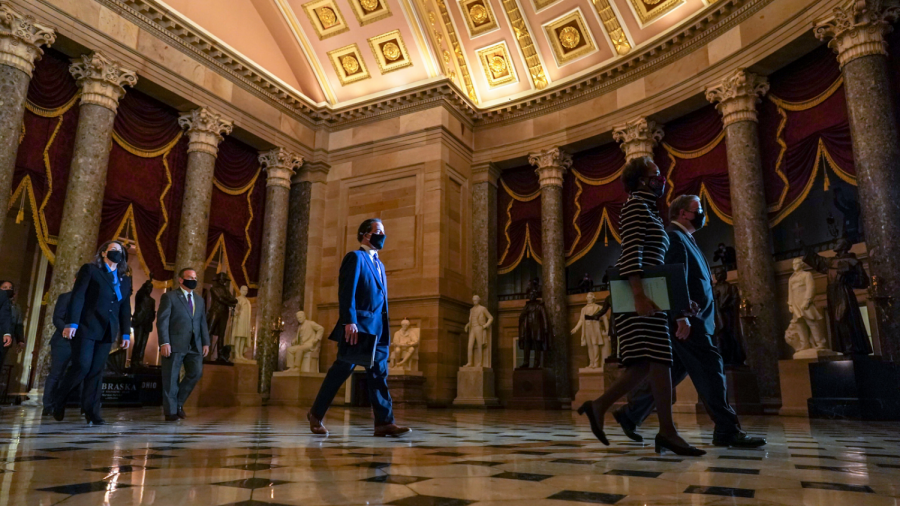Donald Trump’s Impeachment Trial To Begin Feb. 8
January 29, 2021
On Jan. 13, former President Donald Trump was impeached for the second time by the House of Representatives on the charge of incitement of insurrection with a vote of 232-197. Trump, the first president to be impeached twice, received his second impeachment on the charge of incitement of insurrection in the wake of the Jan. 6 storming of the Capitol, which killed 5 people.
Unlike Trump’s first impeachment, which passed the House on party lines, ten Republican representatives joined the unanimous Democratic party vote to pass the resolution. Rep. Liz Cheney (R-WY) said in a speech on the House floor that Trump “summoned this mob, assembled the mob, and lit the flame of this attack.” Speaker of the House Nancy Pelosi (D-CA),commenting on the rare cross-party vote, said, “Today, in a bipartisan way, the House demonstrated that no one is above the law, not even the President of the United States.”
“They’ve [the Senate] now informed us they’re ready to receive [the article of impeachment],” said Pelosi. Trump’s trial must begin within 24 hours after the Senate receives the article of impeachment. However, with a packed agenda from President Joseph Biden and a largely unfilled cabinet, the timing of the trial is in flux. Senate Democrats must decide whether to focus on demands from the executive branch, carry out the trial, or find some way to balance the two.
Several questions remain about how the trial will proceed. The Senate gets to decide the format of each impeachment, and negotiates the rules for the trial. It is unclear whether this will be “a full-blown trial with evidence and witnesses,” says Senate Majority Whip, Dick Durbin (D-IL). In Trump’s 2020 trial, each side had a total of 24 hours to make their case and there were no witnesses, but that may not be the case for the upcoming trial. The question of witnesses is especially pertinent due to the fact that the whole of the jury (the senators) were also victims (and witnesses) to the alleged crime.
On Jan. 22, Senate Majority leader Chuck Schumer (D-NY) announced on the Senate floor that the trial will begin on the week of Feb. 8 with pre-trial proceedings on Monday evening of that week. The House delivered the articles of impeachment on the 25th, and the senators were sworn in as jurors. The actual arguments will not start, however, until later.
As in all other impeachment trials, the Senate must convict Trump with a supermajority of 67 votes. This would require all 50 Democratic senators and 17 Republican senators to vote in favor. Last year, this would have been unthinkable, but 17 senators, while not a guarantee, is within the realm of possibility now. If House impeachment managers are able to secure votes from Senate leadership like Minority Leader Mitch McConnell (R-KY), other Republican senators will likely follow.
Forty-five GOP senators, led by South Carolina Senator, Lindsey Graham, voted on the 26th to dismiss the trial before it begins, saying that putting an ex-president on trial is unconstitutional. However, there is a precedent for the Senate trying an ex-official. In 1876, the Senate tried and acquitted former Secretary of War, William Belknap, even though he had resigned a month before. Multiple legal scholars, including some from the right-wing Federalist Society, dispute the claims made by Senate Republicans. This argument will likely be a major pillar of Trump’s legal strategy, notwithstanding its legal fragility.
Trump’s current legal team and strategy are in disarray. Two of his most prominent lawyers, Alan Dershowitz and Rudy Giuliani, have both stated that they will not represent Trump for the trial. Trump has not yet announced his legal team, and his strategy is unknown.
While it may seem like overkill to try a former president when they cannot be removed from office, conviction would be a major blow to Trump’s post-presidential life. First and foremost, a conviction would bar Trump from running for president in 2024, a prospect that Trump has flirted with, making statements like “we’ll do something,” on Jan. 23 at his international golf club restaurant.
A conviction for the president would also make him ineligible to receive any of the benefits guaranteed under the Former President Act of 1958. He would lose his approximately $220,000 yearly pension, private office staff funding, his ability to be treated at a military hospital, and potentially his Secret Service protections.
Former presidents can often receive intelligence briefings. Informing past presidents, however, is up to the discretion of the current president. Even without a conviction, it seems unlikely President Biden would allow Trump any access to any classified information given the acrimonious relationship between Mr. Biden and Mr. Trump.
